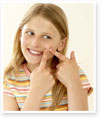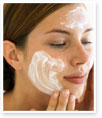The truth of acne:
Acne is a skin condition that occurs when the pores or hair follicles on the skin are plugged. It mainly affects the face, neck, chest, back, shoulders and/or upper arms of sufferers. The oil or sebum produced by the sebaceous glands, which normally drains out of these pores, gets blocked, and bulges out to form blackheads, whiteheads, pimples or cysts (deeper extensive inflamed lesions in the skin). Blackheads are formed when the clogged pores are close to the skin surface. They are black because of the skin pigment melanin (and not dirt!) in them. Whiteheads represent deeper clogged pores. When the wall of the clogged follicle breaks to release the oil, dead skin and bacteria, it gives rise to small inflamed, pus filled bumps, called pustules, pimples or zits.
Tackling acne
In most cases, mild acne resolves by itself, but moderate to severe cases of acne, if left untreated, may become inflamed, infected and painful, and scar the skin. So it is wiser to seek treatment for acne at an early stage.
Several factors such as vitamin deficiency, stress, hormonal imbalances, dietary changes and so on play a role in acne, and it varies in different individuals. Though there is no single, magical cure for acne, though several treatment options are available that can help reduce the breakouts, and prevent scars.
Topical creams or lotions containing benzoyl peroxide, which kills P.acnes bacteria and dries up the oil, or salicylic acid (an exfoliant that removes dead skin), are available over the counter, and can help tackle mild cases of acne. Consult a dermatologist if your acne gets worse or refuses to clear up. You may be prescribed class of oral antibiotics such as erythromycin or tetracycline. But donít take anything without consulting your doctor.
Adult acne and hormones:
Acne by its very nature can be considered a hormonal disease. Hormones are responsible for the maturation of the oil glands in our skin. This is why children do not experience acne.
There are several times in our lives when our hormones can become unbalanced and wreak havoc, including puberty, pregnancy menopause, and, well, any other time they feel like it. More specifically, acne may be precipitated by androgens, male hormones present in both men and women. The oil surplus created by these hormones may be instrumental in clogging hair follicles where bacteria grows and causes acne pimples and blemishes.
What is a good basic skin regimen?
These are all good basic skin regimens that may help with the acne battle:
- Cleanse twice daily with a 5% benzoyl peroxide wash. An alternative for those who are allergic to benzoyl peroxide is salicylic acid.
- Apply a gel or cream containing 5% benzoyl peroxide; an alternative is sulfur or resorcinol.
- At night, apply a spot cream containing sulfur to the affected areas.
- Use a light skin moisturizer and oil-free makeup.
 
For further information contact: www.eehealthbook.com
|